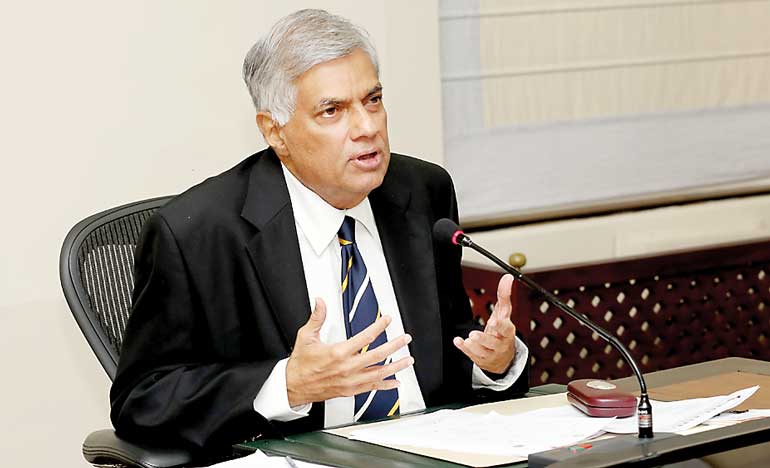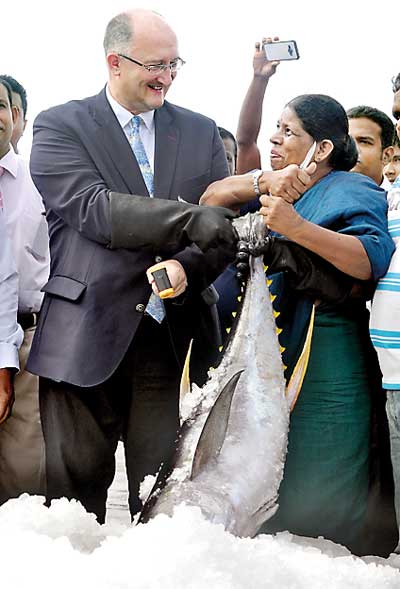Monday Feb 16, 2026
Monday Feb 16, 2026
Saturday, 18 June 2016 00:00 - - {{hitsCtrl.values.hits}}

Prime Minister Ranil Wickremesinghe
Making a special statement on the European Union (EU) officially lifting its fisheries ban on Sri Lanka Prime Minister Ranil Wickremesinghe yesterday outlined a slew of measures to boost the economy including regaining GSP+ and signing the Economic and Technology Cooperation Agreement (ETCA) with India by end 2016.
“The fisheries industry now has the opportunity to export fish to the European Union. From Chilaw to Dondra head all fishermen should make this an occasion to increase the profitability of their businesses”
To uplift the local fisheries industry with advanced technology the government has requested assistance from Norway, one of the leading countries in the global fisheries industry, he said. The Government also announced its plans to set up fisheries training institutes to advance fisheries education in the country.
“The government is confident that it would regain the GSP+ before the end of the year. This would further increase the competitive edge for local fish exports in the EU market. President Maithripala Sirisena promised that the country would regain GSP+. Before granting the GSP+ the terms and conditions that need to be inculcated are being discussed at a non-official level.
In the next two to three weeks we will be ending that program. After that GSP+ application will be handed over to the EU headquarters in Brussels,” he said.
Wickremesinghe also insisted he is confident that before the end of this year Sri Lanka will regain GSP+. He opined it would provide more benefits for the fishing community. The reduction of import taxes for the apparel and tea industries would also receive major benefits for the economy. Newer industries will also get the opportunity to enter the EU market spurring more foreign investments, he noted.
“We are in discussion with India on the ETCA. We will be able to sign the agreement before the end of this year. This would provide us access to another large market. Collaboration between the Indian Oil Corporation and the Ceylon Petroleum Corporation is planning to revamp and develop the Trincomalee Oil storage facility.”
A free trade agreement with China will be signed by the end of next year, the premier said in line with celebrating the 60th anniversary of the diplomatic relations between Sri Lanka and China.
“We are also coming in to a new agreement with the China Harbour Company regarding the Port city. The land will be only be provided on a lease basis. Our intention is not to make this a port city but a financial city. With the inclusion of the Financial, trade and legal services we can fill the void between Singapore and Dubai. Hopefully we will sign that agreement by August.”
The Hambantota ship yard will be completed by the end of August or September, Wickremesinghe said while the company involved has promised to provide Sri Lanka with a report of the plans within a short period of time for the Hambantota Harbour and an industrial zone.
“We are also intending to sign an economic trade agreement with the government of Japan. President Maithripala Sirisena participated at the G7 summit in Japan. With the aid of the Japanese government we plan to introduce an LRT train service to solve the problem of traffic congestion in Colombo. They have also agreed to provide aid for a flyover system for Rajagiriya.”
A flyover from Peliyagoda to the Harbour will be constructed with the aid provided by the ADB. Under a Government plan Welikada Prison will be shifted to the Kalutara district to free up space of about 30-40 acres to build a trading city in Welikada. The initial program will be initiated by the Megapolis Minister Champika Ranawaka as trade discussions on an FTA with Singapore is expected to kick off during Wickremesinghe’s visit there next month.
“We managed to achieve all this is because the combination of President Maithripala Sirisena’s good governance principles and the making up of the national government. I’m requesting everyone to throwaway their communal and religious divides and come to a common solution.”
The availability of peace, economic development and increasing investments will ensure higher purchasing power for everyone, assured the Prime Minister. New job opportunities will eliminate unemployment.
“With new housing schemes there will be a new middle class. The confidence in regard to the future will grow among everyone and their children. With 13 years of compulsory education the ministry of education intends to provide better teachers and principals. “
“For now we can conduct a huge amount of work from the Western province to the southern province (Negombo to Hambantota). President Maithripala Sirisena is doing a significant amount of work in Polonnaruwa. All legal requirements for development projects that will be conducted in other districts will be hand over to the parliament in the next to two-three months.”

EU Ambassador David Haley and Ministry of Fisheries and Aquatic Resources Secretary W. Adikari holding a Yellowfin Tuna signifying the end of the EU fish Ban. - Pic by Lasantha Kumara
By Devin Jayasundera
Fish exporters yesterday hailed the European Union officially announcing the removal of the 15-month fish export ban with immediate effect but warned recovery could take years as the industry still had to win back its customers.
In October 2014, Sri Lanka was listed as a non cooperating country in the fight against illegal, unreported and unregulated fishing (IUU).
As a result of this, for the first time in the last decade the Sri Lanka marine capture fisheries plummeted by -1.4% in volume terms in 2015.
Sri Lanka was the second biggest exporter of yellow fin tuna and sword fish to the EU accounting for almost 70% of the total export basket prior to the ban. The removal of the ban will revive the fish export business which experienced one of the worst years in recent times recording a -33.7% volume de-growth last year. A leading sea food exporter speaking to Daily FT pointed out the ban incurred a huge damage to the industry that would take three or four years to recover to the same levels as 2014.
“Our business experienced a 90% drop in turnover. We have a big fight in getting our customers back. Some of these buyers we have lost have been dealing with us for the last ten to sixteen years prior to the ban. It’s a significant challenge to rebuild these relationships”.
The Sea Food Exporters Association spokesperson Col. C. Weeratunga stated that out of the 33 registered companies involved in fish exports 17 companies closed down their operations as a result of the EU fish ban.
With the trust in Sri Lankan products sinking to the lowest level, Col. Weeratunga stressed the need for an image building campaign within the EU community about the new status achieved by the Sri Lankan fisheries industry. He also added that the Sea Food Exporters Association intended to certify their products through a certification body especially for Yellowfin Tuna which contributes 70% of the total fish exports to the EU.
During this period most sea food exporters aggressively diversified their market and product portfolios to stay in business. USA, Japan and the Netherlands became the leading export countries whilst shrimp, crab and other aquaculture products emerged as the key export products in the post ban era as the EU ban was not applicable to aquaculture products.
The fish ban was revoked after the government complied with the 57 conditions laid down by the EU which ensured stricter regulations and monitoring of Sri Lanka’s fishing fleets in international waters. Ministry of Fisheries and Aquatic Resources Secretary W. Adikari said that the establishment of the vessel monitoring centre and the installation of transponders to the 1500 Multi day boats will place Sri Lanka as a country that produces fish to the highest ethical and sustainability standards.
In referring to Sri Lanka’s lack of monitoring capacity being the key factor for unreported fish catch the EU Ambassador David Daly stated that with the installation of the vessel monitoring system authorities can better track the catch reports of fishermen. This provides the leverage to Sri Lanka to have a more influential role in discussions with the Indian Ocean Tuna Commission (IOTC) and other regional bodies”.